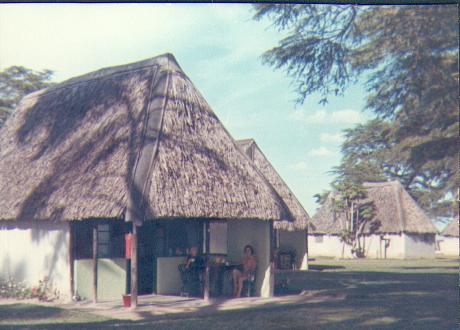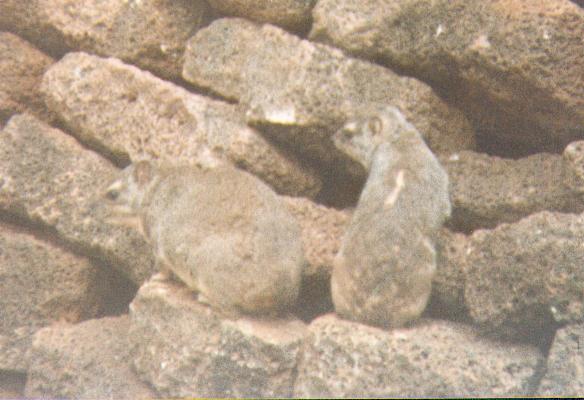In both Tsavo, on our way to the coast, and in Amboseli on the return journey, we stayed in self-service bandas (thatched huts), which meant that we were entirely on our own and had to be self sufficient – one step up from camping – which was what my mother and I were used to doing many years before. Consequently we had no guides when we set out on a game drive morning and evening, and having to rely on a set of old game park maps occasionally threw up interesting problems when negotiating difficult terrain. On one circuit to the famous Mzima springs to watch the hippo from an underwater hide built into the bank, we could see a couple of tourist mini-buses ahead of us stationary at the bottom of a very steep hill, with the occupants standing at the top, looking anxiously down at their transport. We soon realised why. The problem appeared to be that we had to negotiate the seemingly vertical Shetani (devil) lava flow, littered with rocks and cavernous gullies giving an extremely unstable footing for the vehicles. There was nothing to do but brave it, and so, having evicted J-M and D to lessen the load, following the lead of the two mini-buses to the sound of encouraging shouts from all the assembled passengers at the top we slithered, slipped, bumped, and bounced our way upwards, to be greeted with great relief by a clapping and admiring audience when we reached safety. Hurrah!

In contrast to this hair-raising test, The Day of the Great Famine luckily ended with some amusement. By the last day I had badly miscalculated our staple supply of bread, thus causing much consternation among the hungry troops! J-M hit on the brilliant idea of asking at the main Kilaguni Lodge some distance away (frightfully posh with all mod cons) if we could possibly buy a loaf to tide us over, and were told to come back later that afternoon and they would see what they could do. Managing on our meagre picnic we survived until the baking was done, when, to our utter amazement and astonishment we were presented with their normal catering-sized loaf weighing in at 3lbs! We drove back rapidly and proceeded to demolish a sizeable chunk of the still warm bread with great relish.
The variety of strange noises to be identified at night caused much interest and some trepidation, especially that of a pride of lions not that far off, and the hideous cackling of hyaena. Keeping us company inside our bandas were plenty of geckos, little lizards with translucent skins who patrolled the walls, feasting on the moths and other small insects attracted by the light of our Dietz (paraffin) lamps. They were a constant distraction from our card games as we watched, entranced and amused by their stalking tactics and the final assault, with the resultant lip smacking in obvious satisfaction. This activity also led to our betting on the outcome of each stalk using matches as stake money!

Sadly we witnessed one tragedy when we spotted a mongoose attacking a newly-born rock hyrax, whose mother was only able to make feeble attempts at retaliation. Unfortunately it was impossible to rescue the baby, and we had to accept the fact that this was just another natural hazard to be faced by such creatures. On a happier note, although there was a distinct lack of elephants due to poaching, we notched up more sightings of unusual animals: a pair of adorable bat-eared foxes; several odd-looking gerenuk with their long giraffe-like necks, standing up on their hind legs to browse on the lower branches of the thorn trees; and the beautifully-marked lesser kudu.

The birds, too, were spectacular, with over 70 species being readily identified without specifically going spotting. They included highly colourful bee eaters, kingfishers, rollers, orioles and hoopoes; unusual-looking secretary birds and hornbills; delicate, beautiful crowned cranes; a massive, vicious-looking martial eagle; not to mention a host of lesser fry with evocative names such as mousebird, honey sucker, butcher bird, go-away bird, oxpecker or tick bird, water bottle bird, hammerhead and widow bird.

